Discretionary Trusts: Definition, Uses, and Tax Avoidance
VerifiedAdded on 2023/06/13
|12
|1105
|191
AI Summary
This presentation provides an overview of discretionary trusts, including their definition, uses, and benefits. It also discusses the exploitation of discretionary trusts to avoid tax and provides a critical analysis of their benefits and detriments. Finally, recommendations for reform are provided.
Contribute Materials
Your contribution can guide someone’s learning journey. Share your
documents today.
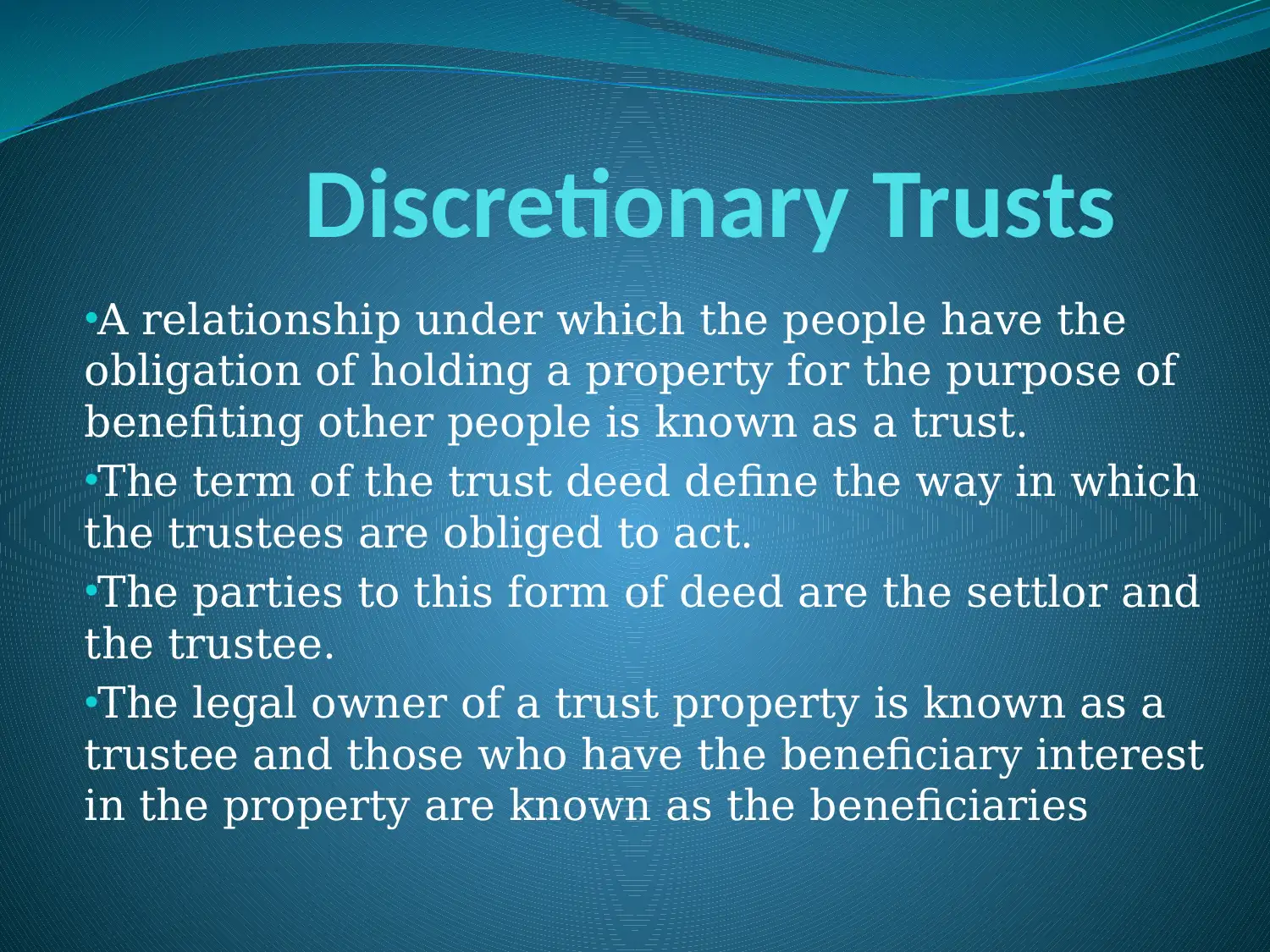
Discretionary Trusts
•A relationship under which the people have the
obligation of holding a property for the purpose of
benefiting other people is known as a trust.
•The term of the trust deed define the way in which
the trustees are obliged to act.
•The parties to this form of deed are the settlor and
the trustee.
•The legal owner of a trust property is known as a
trustee and those who have the beneficiary interest
in the property are known as the beneficiaries
•A relationship under which the people have the
obligation of holding a property for the purpose of
benefiting other people is known as a trust.
•The term of the trust deed define the way in which
the trustees are obliged to act.
•The parties to this form of deed are the settlor and
the trustee.
•The legal owner of a trust property is known as a
trustee and those who have the beneficiary interest
in the property are known as the beneficiaries
Secure Best Marks with AI Grader
Need help grading? Try our AI Grader for instant feedback on your assignments.
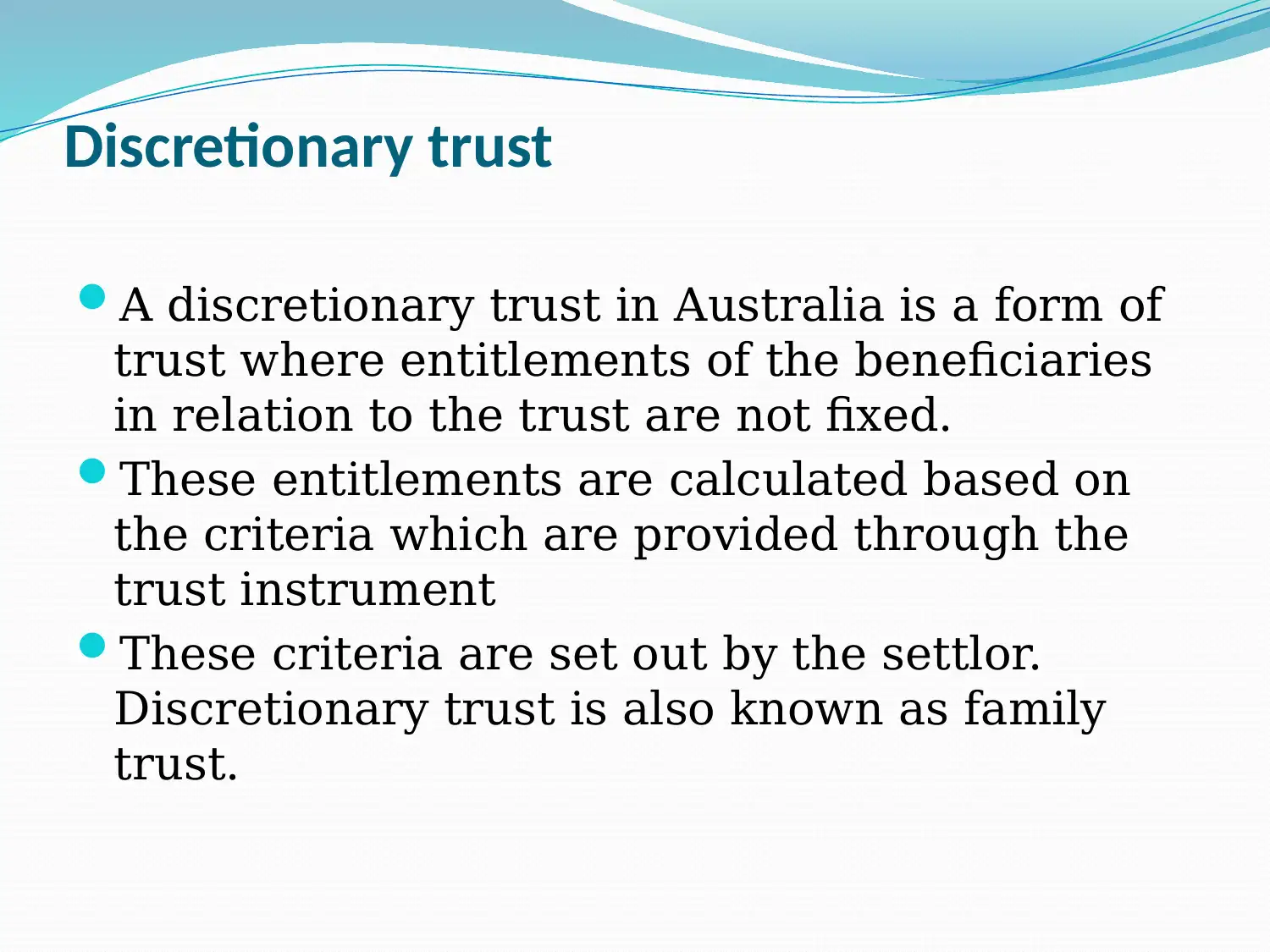
Discretionary trust
A discretionary trust in Australia is a form of
trust where entitlements of the beneficiaries
in relation to the trust are not fixed.
These entitlements are calculated based on
the criteria which are provided through the
trust instrument
These criteria are set out by the settlor.
Discretionary trust is also known as family
trust.
A discretionary trust in Australia is a form of
trust where entitlements of the beneficiaries
in relation to the trust are not fixed.
These entitlements are calculated based on
the criteria which are provided through the
trust instrument
These criteria are set out by the settlor.
Discretionary trust is also known as family
trust.
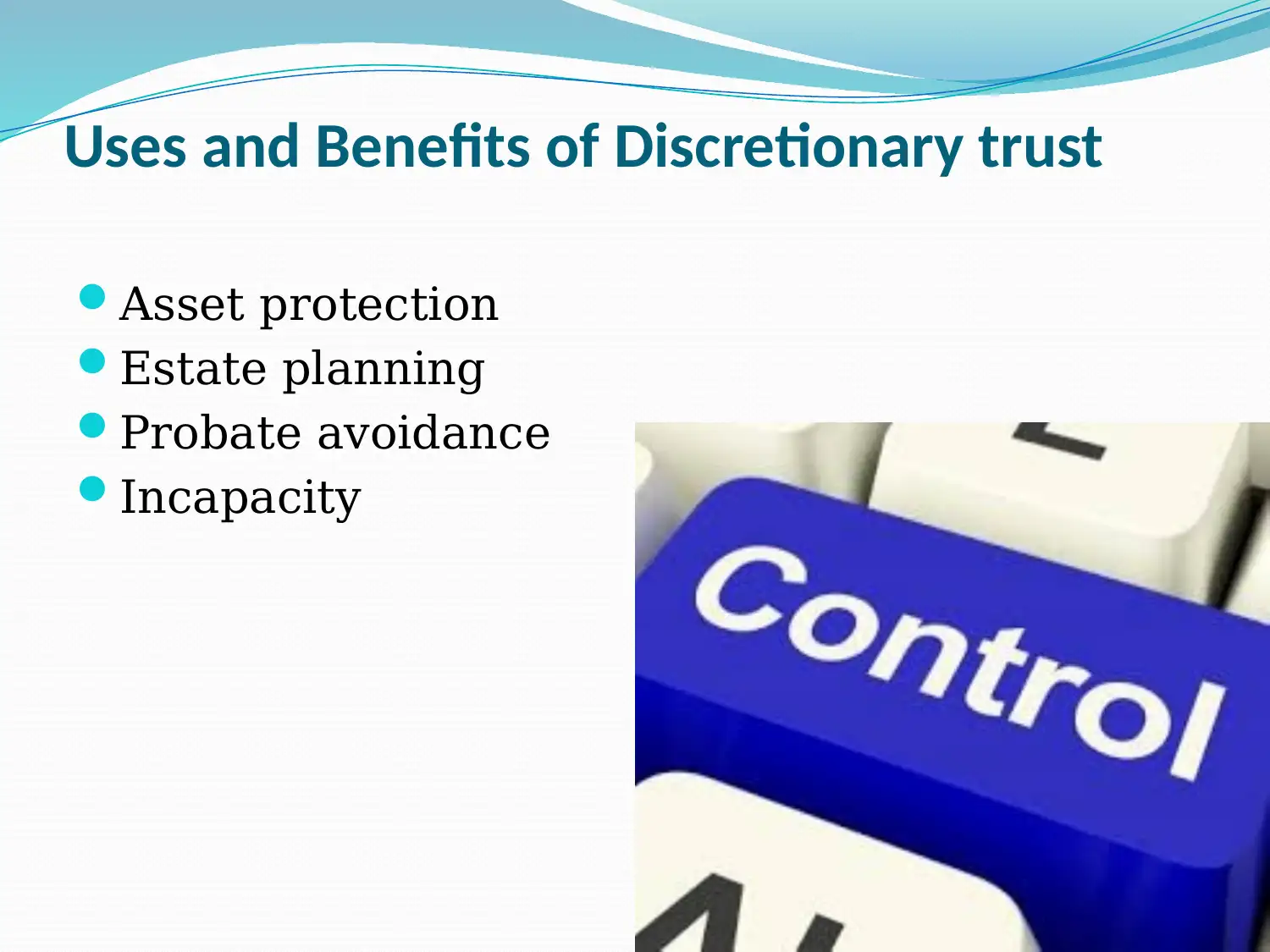
Uses and Benefits of Discretionary trust
Asset protection
Estate planning
Probate avoidance
Incapacity
Asset protection
Estate planning
Probate avoidance
Incapacity
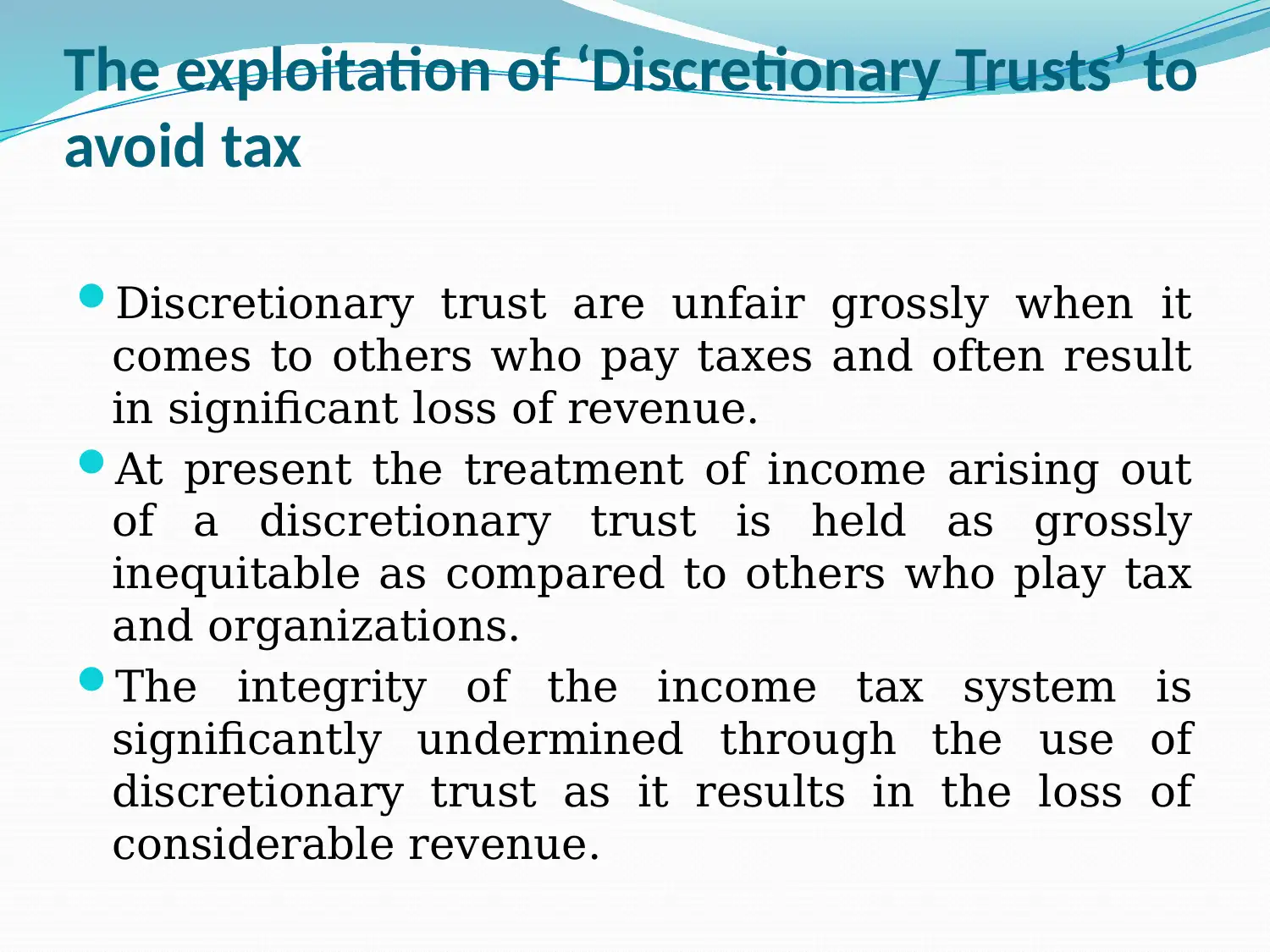
The exploitation of ‘Discretionary Trusts’ to
avoid tax
Discretionary trust are unfair grossly when it
comes to others who pay taxes and often result
in significant loss of revenue.
At present the treatment of income arising out
of a discretionary trust is held as grossly
inequitable as compared to others who play tax
and organizations.
The integrity of the income tax system is
significantly undermined through the use of
discretionary trust as it results in the loss of
considerable revenue.
avoid tax
Discretionary trust are unfair grossly when it
comes to others who pay taxes and often result
in significant loss of revenue.
At present the treatment of income arising out
of a discretionary trust is held as grossly
inequitable as compared to others who play tax
and organizations.
The integrity of the income tax system is
significantly undermined through the use of
discretionary trust as it results in the loss of
considerable revenue.
Secure Best Marks with AI Grader
Need help grading? Try our AI Grader for instant feedback on your assignments.
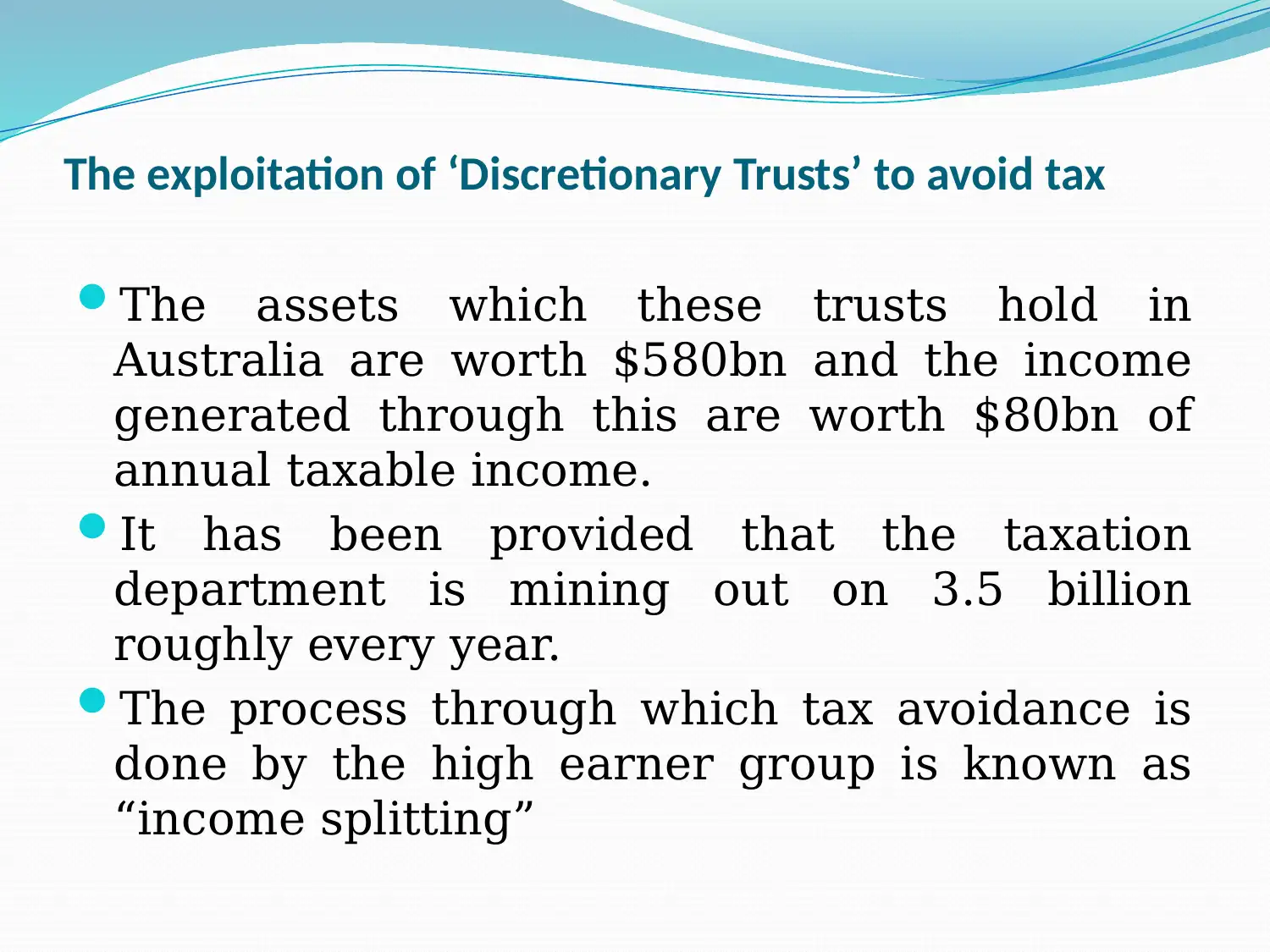
The exploitation of ‘Discretionary Trusts’ to avoid tax
The assets which these trusts hold in
Australia are worth $580bn and the income
generated through this are worth $80bn of
annual taxable income.
It has been provided that the taxation
department is mining out on 3.5 billion
roughly every year.
The process through which tax avoidance is
done by the high earner group is known as
“income splitting”
The assets which these trusts hold in
Australia are worth $580bn and the income
generated through this are worth $80bn of
annual taxable income.
It has been provided that the taxation
department is mining out on 3.5 billion
roughly every year.
The process through which tax avoidance is
done by the high earner group is known as
“income splitting”
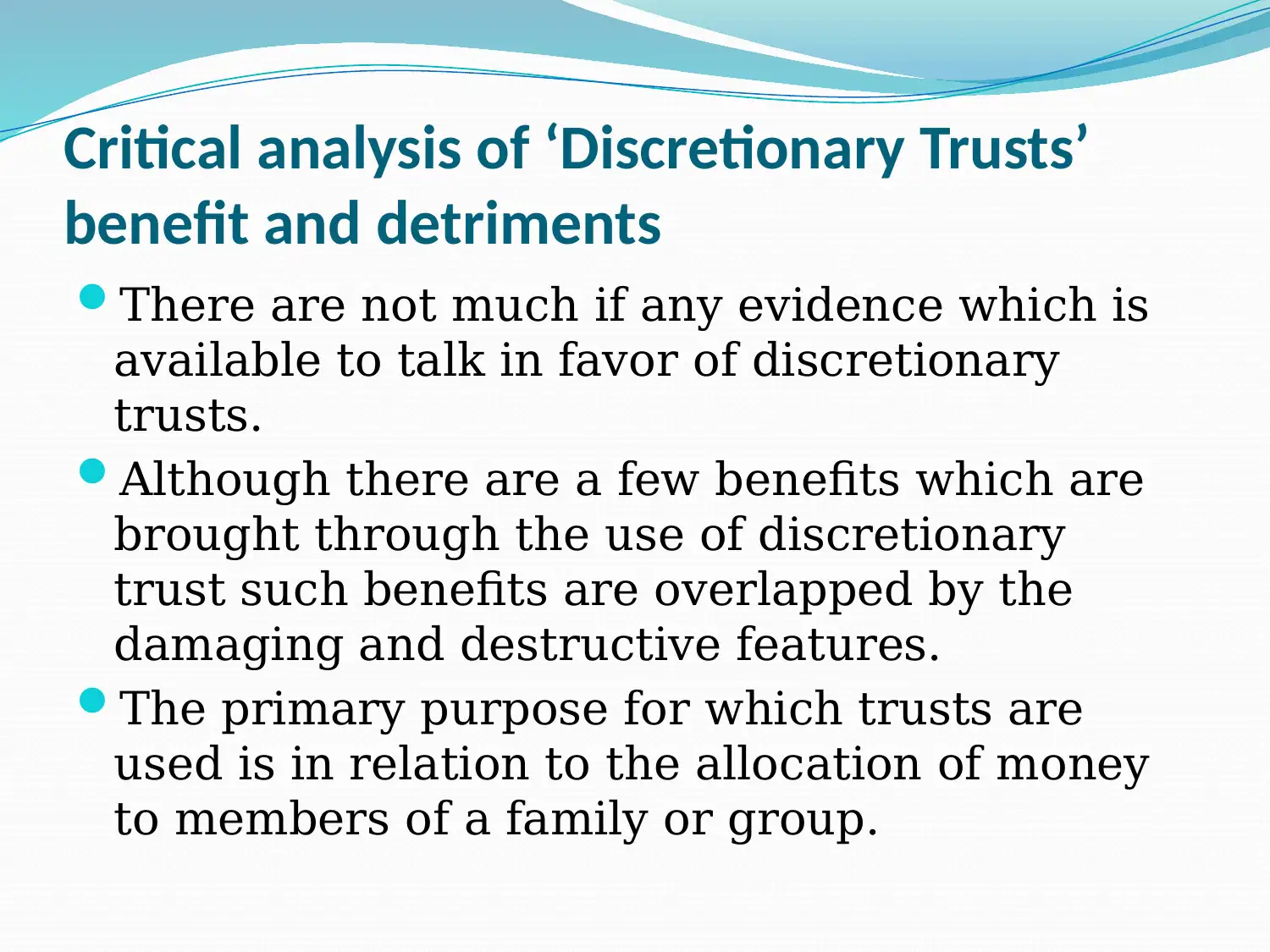
Critical analysis of ‘Discretionary Trusts’
benefit and detriments
There are not much if any evidence which is
available to talk in favor of discretionary
trusts.
Although there are a few benefits which are
brought through the use of discretionary
trust such benefits are overlapped by the
damaging and destructive features.
The primary purpose for which trusts are
used is in relation to the allocation of money
to members of a family or group.
benefit and detriments
There are not much if any evidence which is
available to talk in favor of discretionary
trusts.
Although there are a few benefits which are
brought through the use of discretionary
trust such benefits are overlapped by the
damaging and destructive features.
The primary purpose for which trusts are
used is in relation to the allocation of money
to members of a family or group.
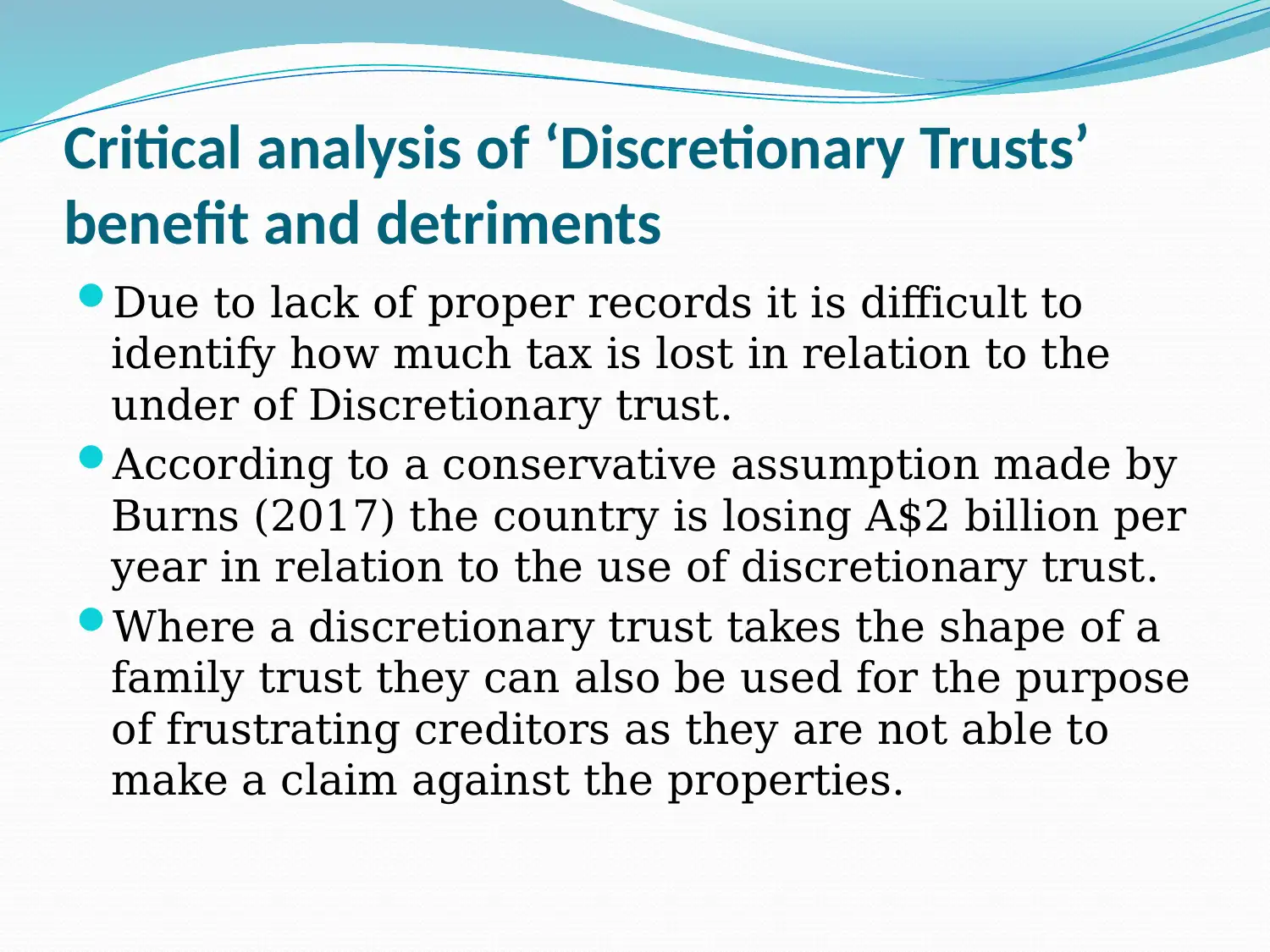
Critical analysis of ‘Discretionary Trusts’
benefit and detriments
Due to lack of proper records it is difficult to
identify how much tax is lost in relation to the
under of Discretionary trust.
According to a conservative assumption made by
Burns (2017) the country is losing A$2 billion per
year in relation to the use of discretionary trust.
Where a discretionary trust takes the shape of a
family trust they can also be used for the purpose
of frustrating creditors as they are not able to
make a claim against the properties.
benefit and detriments
Due to lack of proper records it is difficult to
identify how much tax is lost in relation to the
under of Discretionary trust.
According to a conservative assumption made by
Burns (2017) the country is losing A$2 billion per
year in relation to the use of discretionary trust.
Where a discretionary trust takes the shape of a
family trust they can also be used for the purpose
of frustrating creditors as they are not able to
make a claim against the properties.
Paraphrase This Document
Need a fresh take? Get an instant paraphrase of this document with our AI Paraphraser
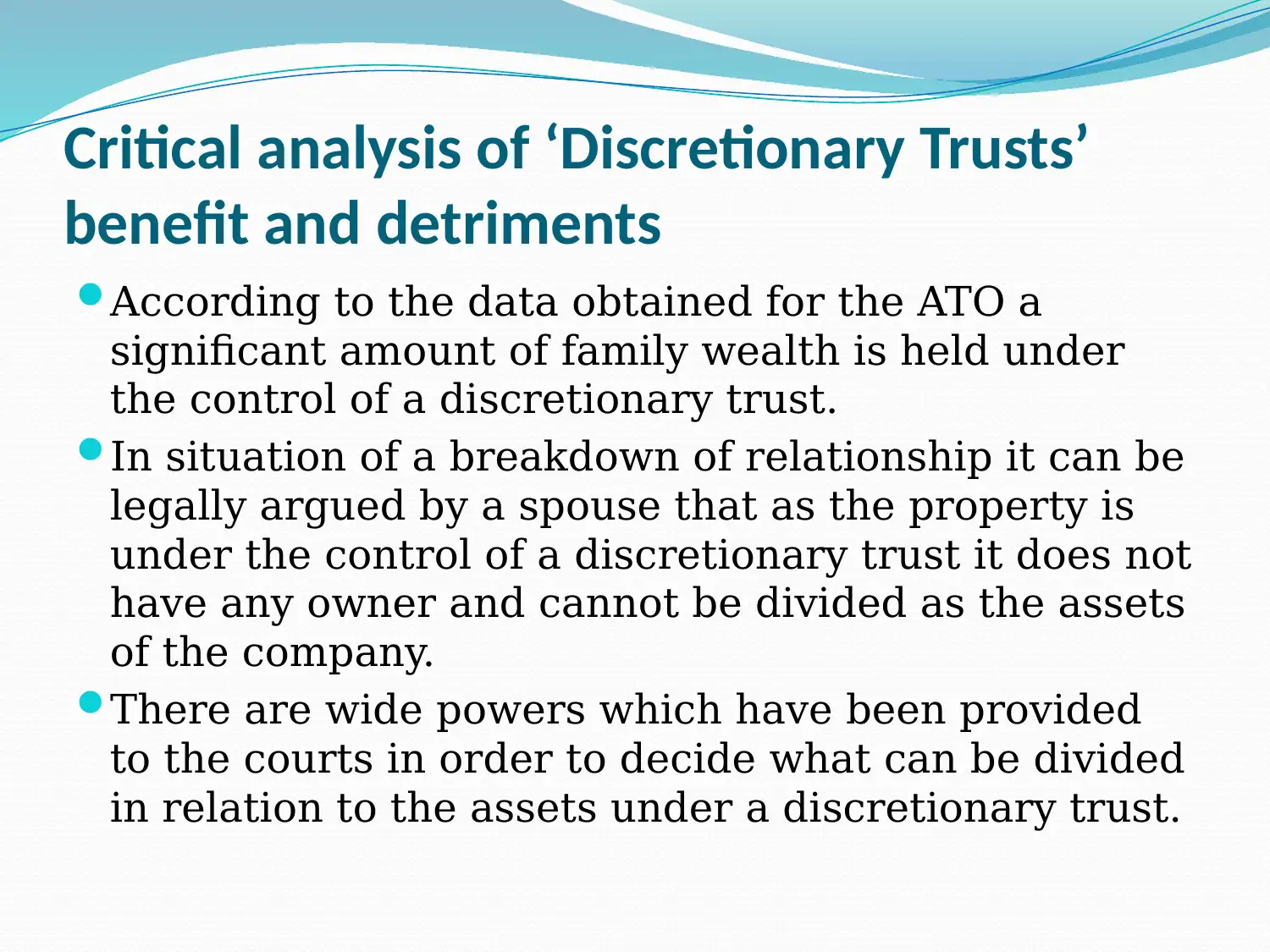
Critical analysis of ‘Discretionary Trusts’
benefit and detriments
According to the data obtained for the ATO a
significant amount of family wealth is held under
the control of a discretionary trust.
In situation of a breakdown of relationship it can be
legally argued by a spouse that as the property is
under the control of a discretionary trust it does not
have any owner and cannot be divided as the assets
of the company.
There are wide powers which have been provided
to the courts in order to decide what can be divided
in relation to the assets under a discretionary trust.
benefit and detriments
According to the data obtained for the ATO a
significant amount of family wealth is held under
the control of a discretionary trust.
In situation of a breakdown of relationship it can be
legally argued by a spouse that as the property is
under the control of a discretionary trust it does not
have any owner and cannot be divided as the assets
of the company.
There are wide powers which have been provided
to the courts in order to decide what can be divided
in relation to the assets under a discretionary trust.
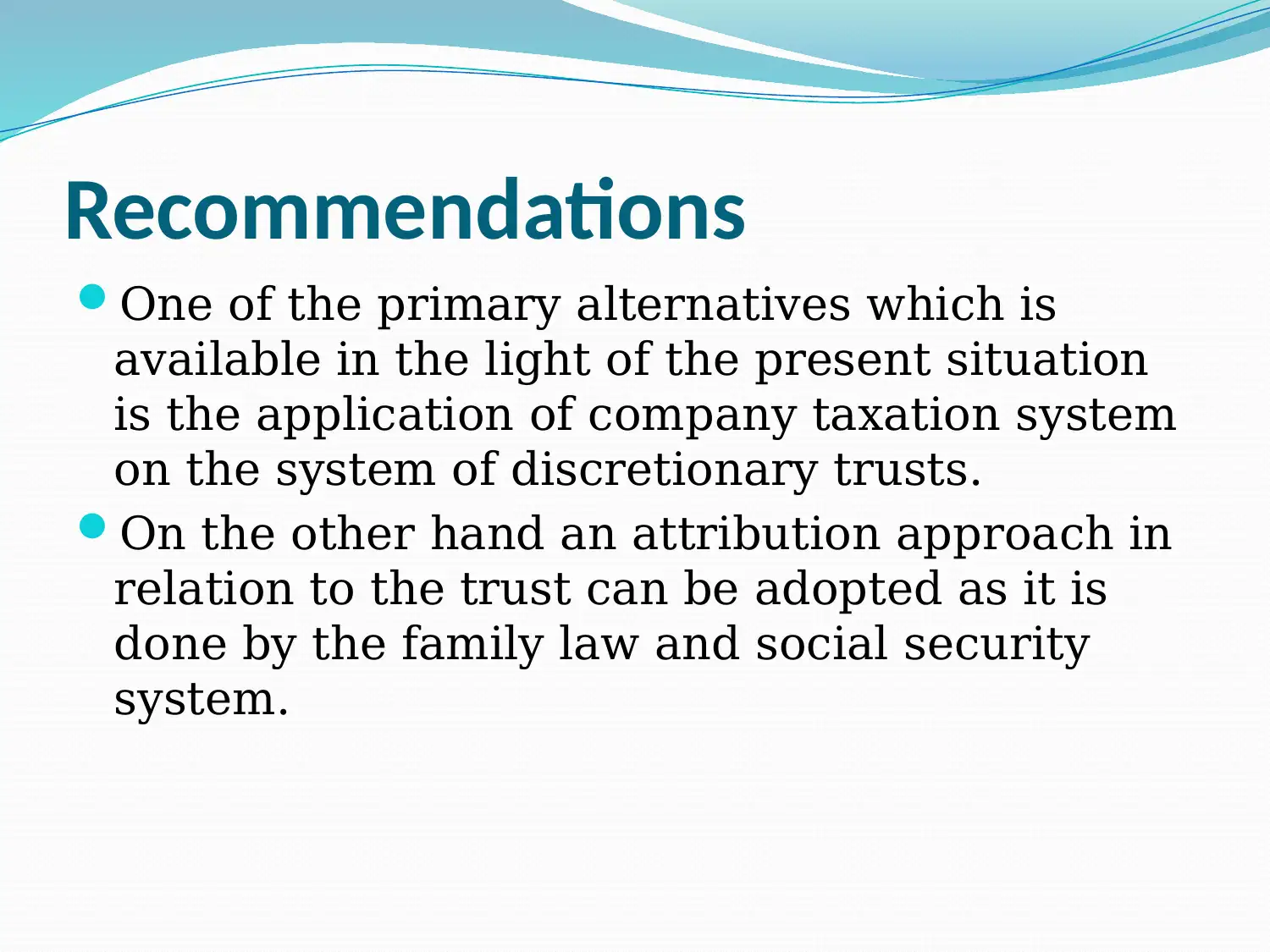
Recommendations
One of the primary alternatives which is
available in the light of the present situation
is the application of company taxation system
on the system of discretionary trusts.
On the other hand an attribution approach in
relation to the trust can be adopted as it is
done by the family law and social security
system.
One of the primary alternatives which is
available in the light of the present situation
is the application of company taxation system
on the system of discretionary trusts.
On the other hand an attribution approach in
relation to the trust can be adopted as it is
done by the family law and social security
system.
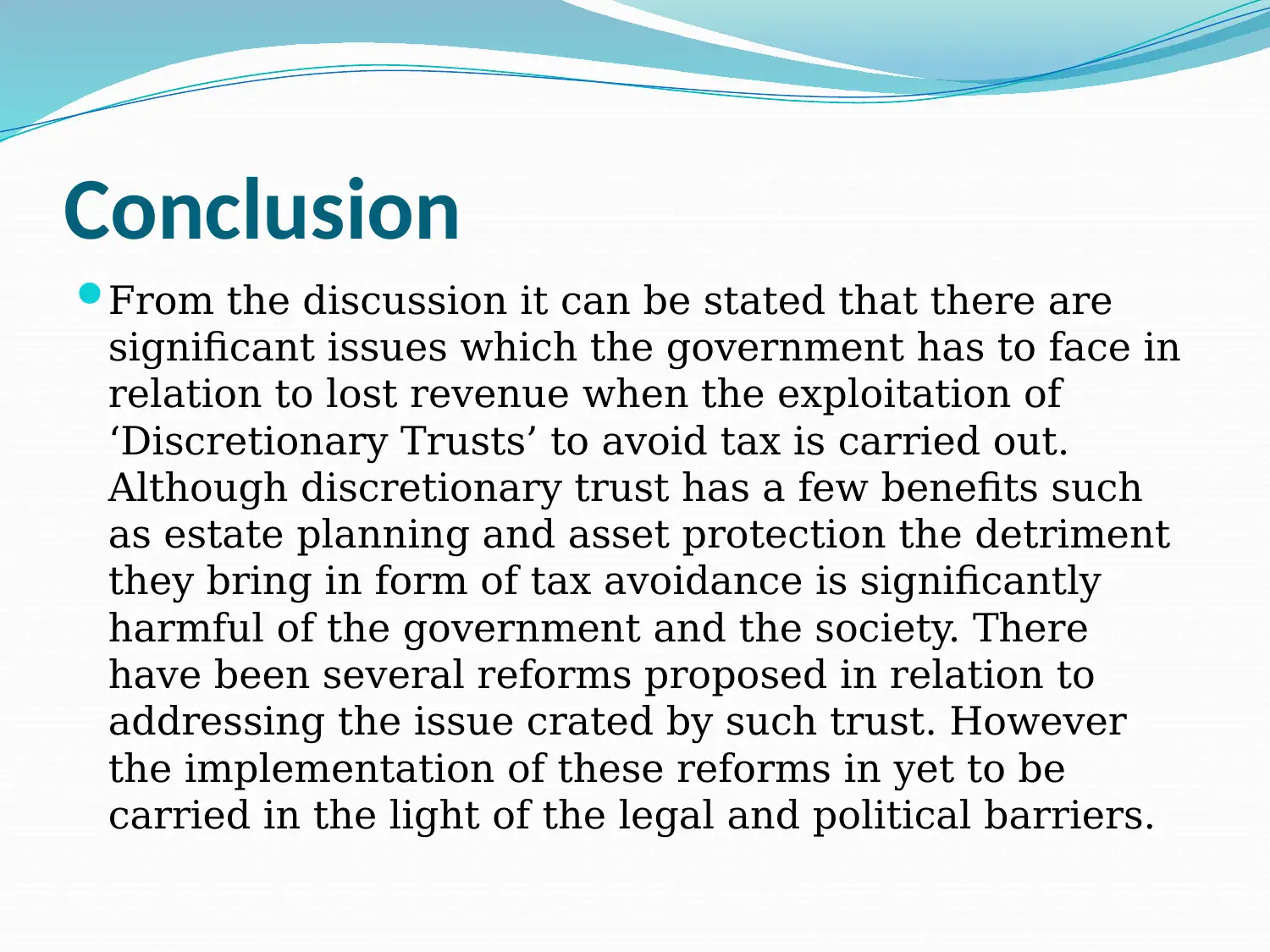
Conclusion
From the discussion it can be stated that there are
significant issues which the government has to face in
relation to lost revenue when the exploitation of
‘Discretionary Trusts’ to avoid tax is carried out.
Although discretionary trust has a few benefits such
as estate planning and asset protection the detriment
they bring in form of tax avoidance is significantly
harmful of the government and the society. There
have been several reforms proposed in relation to
addressing the issue crated by such trust. However
the implementation of these reforms in yet to be
carried in the light of the legal and political barriers.
From the discussion it can be stated that there are
significant issues which the government has to face in
relation to lost revenue when the exploitation of
‘Discretionary Trusts’ to avoid tax is carried out.
Although discretionary trust has a few benefits such
as estate planning and asset protection the detriment
they bring in form of tax avoidance is significantly
harmful of the government and the society. There
have been several reforms proposed in relation to
addressing the issue crated by such trust. However
the implementation of these reforms in yet to be
carried in the light of the legal and political barriers.
Secure Best Marks with AI Grader
Need help grading? Try our AI Grader for instant feedback on your assignments.
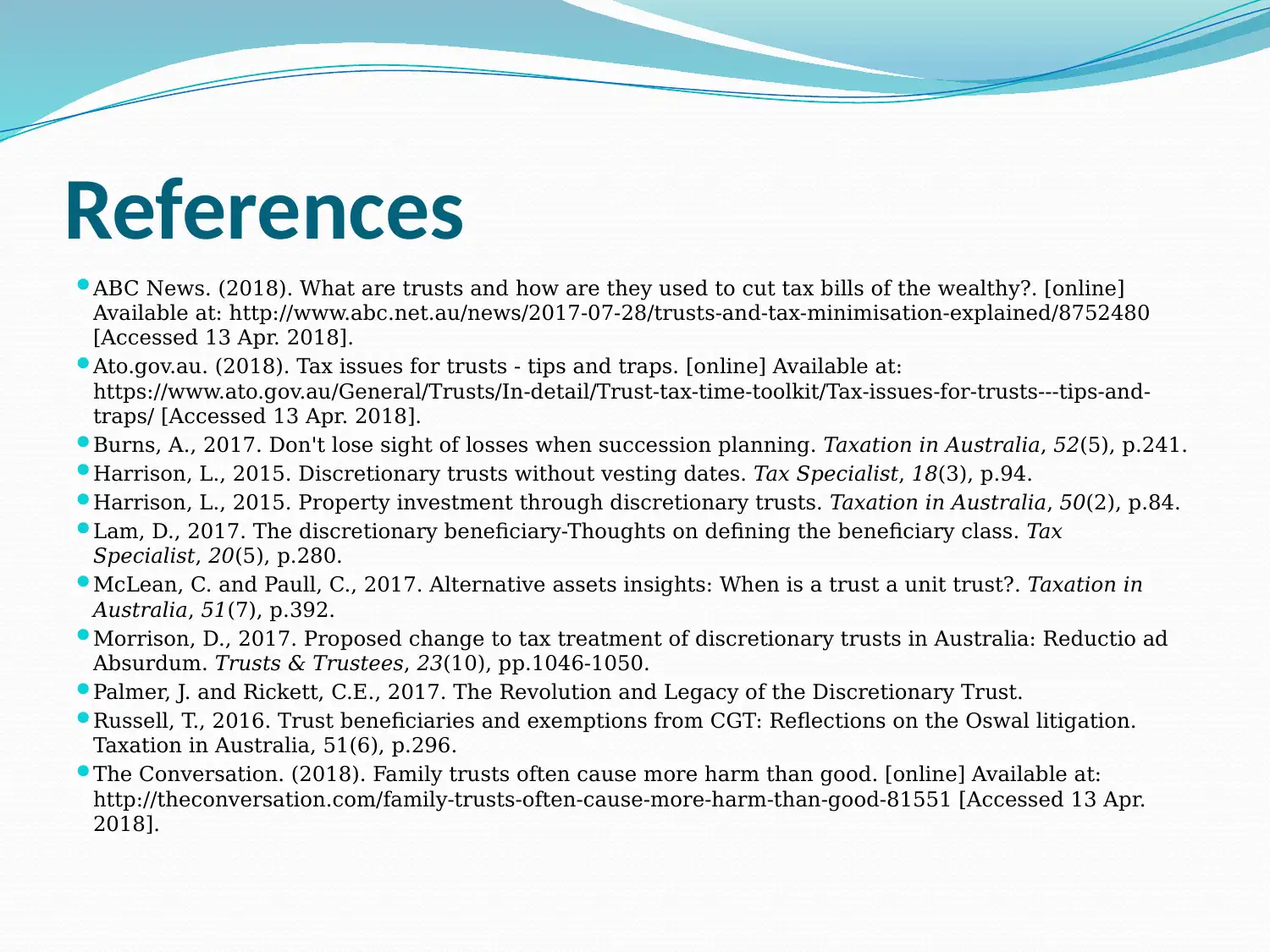
References
ABC News. (2018). What are trusts and how are they used to cut tax bills of the wealthy?. [online]
Available at: http://www.abc.net.au/news/2017-07-28/trusts-and-tax-minimisation-explained/8752480
[Accessed 13 Apr. 2018].
Ato.gov.au. (2018). Tax issues for trusts - tips and traps. [online] Available at:
https://www.ato.gov.au/General/Trusts/In-detail/Trust-tax-time-toolkit/Tax-issues-for-trusts---tips-and-
traps/ [Accessed 13 Apr. 2018].
Burns, A., 2017. Don't lose sight of losses when succession planning. Taxation in Australia, 52(5), p.241.
Harrison, L., 2015. Discretionary trusts without vesting dates. Tax Specialist, 18(3), p.94.
Harrison, L., 2015. Property investment through discretionary trusts. Taxation in Australia, 50(2), p.84.
Lam, D., 2017. The discretionary beneficiary-Thoughts on defining the beneficiary class. Tax
Specialist, 20(5), p.280.
McLean, C. and Paull, C., 2017. Alternative assets insights: When is a trust a unit trust?. Taxation in
Australia, 51(7), p.392.
Morrison, D., 2017. Proposed change to tax treatment of discretionary trusts in Australia: Reductio ad
Absurdum. Trusts & Trustees, 23(10), pp.1046-1050.
Palmer, J. and Rickett, C.E., 2017. The Revolution and Legacy of the Discretionary Trust.
Russell, T., 2016. Trust beneficiaries and exemptions from CGT: Reflections on the Oswal litigation.
Taxation in Australia, 51(6), p.296.
The Conversation. (2018). Family trusts often cause more harm than good. [online] Available at:
http://theconversation.com/family-trusts-often-cause-more-harm-than-good-81551 [Accessed 13 Apr.
2018].
ABC News. (2018). What are trusts and how are they used to cut tax bills of the wealthy?. [online]
Available at: http://www.abc.net.au/news/2017-07-28/trusts-and-tax-minimisation-explained/8752480
[Accessed 13 Apr. 2018].
Ato.gov.au. (2018). Tax issues for trusts - tips and traps. [online] Available at:
https://www.ato.gov.au/General/Trusts/In-detail/Trust-tax-time-toolkit/Tax-issues-for-trusts---tips-and-
traps/ [Accessed 13 Apr. 2018].
Burns, A., 2017. Don't lose sight of losses when succession planning. Taxation in Australia, 52(5), p.241.
Harrison, L., 2015. Discretionary trusts without vesting dates. Tax Specialist, 18(3), p.94.
Harrison, L., 2015. Property investment through discretionary trusts. Taxation in Australia, 50(2), p.84.
Lam, D., 2017. The discretionary beneficiary-Thoughts on defining the beneficiary class. Tax
Specialist, 20(5), p.280.
McLean, C. and Paull, C., 2017. Alternative assets insights: When is a trust a unit trust?. Taxation in
Australia, 51(7), p.392.
Morrison, D., 2017. Proposed change to tax treatment of discretionary trusts in Australia: Reductio ad
Absurdum. Trusts & Trustees, 23(10), pp.1046-1050.
Palmer, J. and Rickett, C.E., 2017. The Revolution and Legacy of the Discretionary Trust.
Russell, T., 2016. Trust beneficiaries and exemptions from CGT: Reflections on the Oswal litigation.
Taxation in Australia, 51(6), p.296.
The Conversation. (2018). Family trusts often cause more harm than good. [online] Available at:
http://theconversation.com/family-trusts-often-cause-more-harm-than-good-81551 [Accessed 13 Apr.
2018].

1 out of 12
Related Documents
Your All-in-One AI-Powered Toolkit for Academic Success.
+13062052269
info@desklib.com
Available 24*7 on WhatsApp / Email
![[object Object]](/_next/static/media/star-bottom.7253800d.svg)
Unlock your academic potential
© 2024 | Zucol Services PVT LTD | All rights reserved.





